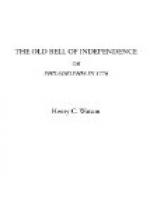“Fagan was never buried; his body hung upon its gibbet till the winds picked the flesh from off his bones, and they fell asunder by their own weight. A friend of mine has seen his horrid countenance, as it hung festering and blackening in the wind, and remembers, by way of amusement, between schools, pelting the body with stones. The old trunk has disappeared, but the spot is still haunted in the belief of the people of the neighborhood, and he is a bold man who dare risk a nocturnal encounter with the bloody Fagan, instead of avoiding the direct road, at the expense of half a mile’s additional walk. No persuasion or force will induce a horse raised in the neighborhood to pass the fated spot at night, although he will express no uneasiness by daylight. The inference is, that the animals, as we know animals do, and Balaam’s certainly did, see more than their masters. A skeptical gentleman, near, thinks this only the force of habit, and that the innocent creatures have been so taught by the cowards who drive them, and would saddle the horses with their own folly.
“I am at the close of my story, and not a lover or a tender scene in the whole tedious relation—alas! what a defect, but it is too late to mind it now; it only remains to take leave of our friends. Nathan and Hannah have mingled with dust, and their spirits with that society whose only business is love, and where sighing and contention can never intrude. Nathan was permitted, on his expressing his sorrow that he had ‘disobliged Friends,’ to rejoin his society, and he died an elder. Rachel departed at a great age, as she had lived, a spotless maiden. The blooming, the warm-hearted, mischievous Amy lives, a still comely old lady, the mother of ten sons, and the grandparent of three times as many more. She adheres strictly to all the rules of her society, and bears her testimony in the capacity of a public Friend. Still, she is evidently not a little proud of her father’s and brothers’ share in the perils and honors of the revolutionary contest, though she affects to condemn their contumacy and unfriendly conformity to the world’s ways, and their violation of ‘Friends’ testimony concerning war.’ Old Annie died four years since, at an almost incredible age, though she was not able to name the exact number of the days of her pilgrimage. From the deep furrows on her cheeks, and the strong lines of her naturally striking countenance, which, as she advanced in years, assumed more and more the character of her Indian parentage, and the leather-like appearance of her skin, she might have passed for an antediluvian. While other less important matters lost their impression on her memory, the Hessian inroads upon her sausages and buckwheat cakes were neither forgotten nor entirely forgiven to the last. She sent for a friend when on her death-bed, to make arrangement of her little affairs. He found her strength of body exhausted, but her powers of mind unimpaired. After disposing her stock of personalities among some of her friends, she turned to him. ’That’s all, Mr. Charles, except the old sash you used to play with, which I sp’iled from the Hessian officer, the Injin—keep that to mind old Anne by,’




